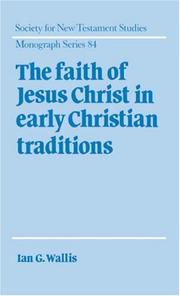| Listing 1 - 2 of 2 |
Sort by
|

ISBN: 0521473527 0521018846 0511470495 9780521473521 Year: 1995 Volume: 84 Publisher: Cambridge : Cambridge University Press,
Abstract | Keywords | Export | Availability | Bookmark
 Loading...
Loading...Choose an application
- Reference Manager
- EndNote
- RefWorks (Direct export to RefWorks)
We are used to the idea of people believing in Christ, but did the early church consider that Jesus also had faith in God? This book evaluates the evidence, starting with a survey of the meaning of faith in Judaism and Graeco-Roman literature and proceeding to a detailed exegesis of the relevant New Testament material from the synoptic Gospels, the Pauline and Deutero-Pauline Epistles, Hebrews and Revelation. Two trajectories of interest in Jesus's faith are identified: the paradigmatic, concerned with matters of discipleship, and the theological, relating Christ to God's gift of salvation. The examination is then broadened to trace the progress of these trajectories through the literature of the first four Christian centuries and concludes by identifying the Arian controversy as the christological development which rendered reference to Jesus' faith untenable.
Jesus Christ --- History of doctrines --- Spiritual life. --- Bible. --- Criticism, interpretation, etc. --- Spiritual life --- Criticism, interpretation, etc --- 225*2 --- Jezus Christus in het Nieuwe Testament: christologie --- -Jesus Christ --- -Christ --- Cristo --- Jezus Chrystus --- Jesus Cristo --- Jesus, --- Jezus --- Christ, Jesus --- Yeh-su --- Masīḥ --- Khristos --- Gesù --- Christo --- Yeshua --- Chrystus --- Gesú Cristo --- Ježíš --- Isa, --- Nabi Isa --- Isa Al-Masih --- Al-Masih, Isa --- Masih, Isa Al --- -Jesus, --- Jesucristo --- Yesu --- Yeh-su Chi-tu --- Iēsous --- Iēsous Christos --- Iēsous, --- Kʻristos --- Hisus Kʻristos --- Christos --- Jesuo --- Yeshuʻa ben Yosef --- Yeshua ben Yoseph --- Iisus --- Iisus Khristos --- Jeschua ben Joseph --- Ieso Kriʻste --- Yesus --- Kristus --- ישו --- ישו הנוצרי --- ישו הנצרי --- ישוע --- ישוע בן יוסף --- المسيح --- مسيح --- يسوع المسيح --- 耶稣 --- 耶稣基督 --- 예수그리스도 --- Jíizis --- Yéshoua --- Iėsu̇s --- Khrist Iėsu̇s --- عيسىٰ --- -Spiritual life --- -History of doctrines --- 225*2 Jezus Christus in het Nieuwe Testament: christologie --- Christ --- Ba-yon Tipan --- Bagong Tipan --- Jaji ma Hungi --- Kainē Diathēkē --- New Testament --- Nouveau Testament --- Novo Testamento --- Novum Testamentum --- Novyĭ Zavet --- Novyĭ Zavi︠e︡t Gospoda nashego Īisusa Khrista --- Novyĭ Zavit --- Nuevo Testamento --- Nuovo Testamento --- Nye Testamente --- Perjanjian Baru --- Dhamma sacʻ kyamʻʺ --- Injīl --- Primitive and early church, ca. 30-600 A.D. --- Bible. New Testament --- Jesus Christ - History of doctrines - Early church, ca. 30-600. --- Jesus Christ - Spiritual life. --- Bible. - N.T. - Criticism, interpretation, etc. --- عيسىٰ --- Arts and Humanities --- Religion --- Jesus Christ - History of doctrines - Early church, ca. 30-600 --- Jesus Christ - Spiritual life
Book
ISBN: 1108980708 1108988075 1108988563 1108970443 Year: 2020 Publisher: Cambridge : Cambridge University Press,
Abstract | Keywords | Export | Availability | Bookmark
 Loading...
Loading...Choose an application
- Reference Manager
- EndNote
- RefWorks (Direct export to RefWorks)
After offering a brief overview of the role of faith within Judaism, Christianity and Islam, an interdisciplinary analysis of faith, belief, belief systems and the act of believing is undertaken. The debate over the nature of doctrine between George Lindbeck and Alister McGrath brings into focus four ways in which beliefs can be employed: expressive, interpretative, formative and referential/relational. An analysis of monotheistic belief ensues which demonstrates how it can function meaningfully in each of these modes, including the last, where insights from phenomenology and relational ontology, as well as philosophical theology, favour a participatory approach in which God is encountered not as an object of investigation, but as that transcendent Other whose worship is the fulfilment of human being. The study concludes by highlighting convergences between the nature of faith presented in the initial scriptural overview and that developed throughout the rest of the study.
Monotheism. --- Faith. --- Religious belief --- Theological belief --- Belief and doubt --- Religion --- Salvation --- Theological virtues --- Trust in God --- Pantheism --- Theism --- Trinity --- Polytheism
| Listing 1 - 2 of 2 |
Sort by
|

 Search
Search Feedback
Feedback About
About Help
Help News
News